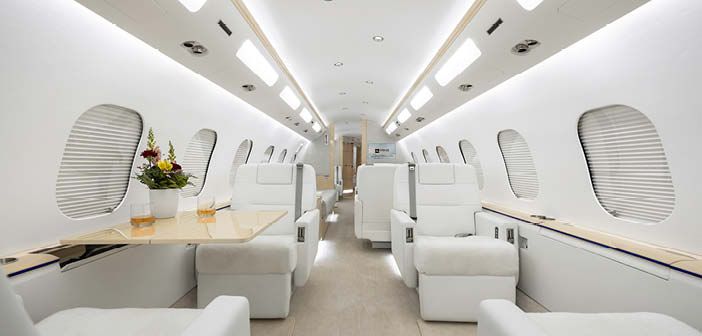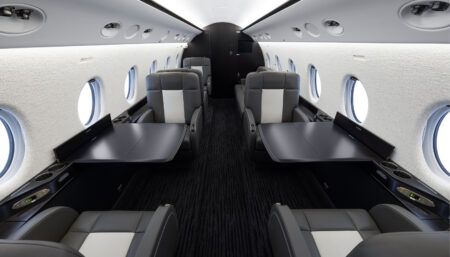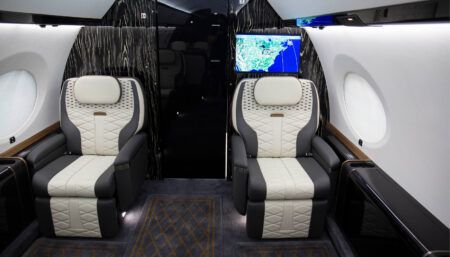Duncan Aviation’s full-service facility in Provo, Utah, has transformed a 2001 GLEX. Every shop at the facility had a role in the project. The aircraft’s paint was stripped and the interior was completely gutted ahead of the transformation. The work included a 240-month inspection and the installation of a Ka connectivity system, new LED lighting and a Honeywell RDR-7000 radar upgrade.
Preparation work for this aircraft project began nearly two years before the major event for regional manager Joe LaCorte, who partnered with Stef Sedam, then part of the airframe services sales team, Matt Spain for paint and interior sales, and Steve Elofson for avionics sales on the quoting process.
“We were given the opportunity by the director of maintenance to perform a 3,000-hour inspection at our Provo facility as a test run about a year before the major inspection project,” said LaCorte. “After a successful event, he trusted us with the complete refurbishment of his GLEX.”
Lead designer Molly Pfeiffer mocked up a full interior specification presentation for the owner before finalising his slot nearly 18 months later.
Modern, timeless and clean
Over the years, the interior of the aircraft had become worn. It featured a mixture of white tones, all with different undertones. Duncan Aviation noted that the materials had not aged well together. To prevent this from happening again, Pfeiffer ensured the white tones selected have a similar yellow undertone so that as they age, the cabin will still present as a cohesive design.
The owner wanted his new interior to be modernised with white, bright and cosy finishes. Duncan Aviation said the difficulty with white tones is finding a way to bring warmth to the interior. To do this, Pfeiffer focused on creating clean modern lines in the cabin. The bulkheads, which used to have a rounded, hardwood, bullnose trim, were simplified to a squared-off fabric insert that is surrounded by new veneer.
“We brought in two different fabrics throughout the cabin; one on the divan and one for the bulkhead inserts,” said Pfeiffer. “Both fabrics feature grey and white patterns that help bring some texture and depth into the cabin.”
The entire interior was gutted. The only thing that stayed was the blue stone inlay on the drink rails. “The blue inlay was a beautiful detail that got lost with the bird’s eye maple used previously,” explained Pfeiffer. “When placed against the new light veneer, it became a really striking detail.”
Typically, the seats in an aircraft are finished in leather. But this aircraft features sheepskin cushions. “The owner specifically requested sheepskin for the seats because he likes the softness and comfort,” said Pfeiffer. “It was the first time I’ve seen this, so we updated the seat design to be more modern and from there we decided to make the entire seat cushion sheepskin, rather than just having the top part of the cushion sheepskin.”
The white carpet was also a challenge for the team. “Since this was a white carpet and we didn’t want to risk it getting dirty from footprints or tool bags, we waited until the very end to install it,” said Pfeiffer. “The carpet really brought the entire interior together.”
Olivia Putman collaboration
Olivia Putman at Studio Putman has a well-established relationship with the aircraft owners that has been filled with trust and respect. The design studio has been working with the family for a long time, and they knew what was expected in the final product.
“Olivia knows the owners very well, so we worked together to bring their vision to life,” said Pfeiffer. “For example, they sent me a regular veneer they liked for the design, so I went on a hunt to find the aviation equivalent of it. I would send them different design options and they’d choose the best fit for the owner. I truly enjoyed working with them.”
Duncan Aviation noted Pfeiffer and Putman complemented each other in a way that resulted in the owners being more than pleased with the design choices, the quality of work, and the overall refurbishment.
“Molly was extremely important in the process and helped us to achieve this beautiful project with the best craftmanship she could provide,” said Putman. “The quality of work by Duncan Aviation is really flawless. It was an incredible pleasure to bring our design to the sky. In the history of Studio Putman, my mother, Andrée Putman, designed the Concorde. This was the first time I’ve designed an aircraft, and it was an honour.”
For Pfeiffer, this was one of the most challenging projects she’s worked on. “Working with all white and making the owners vision come together without creating a stark and cold environment was a challenge,” said Pfeiffer. “When you fly, you are in the aircraft for a long time. You want the space to be comforting and inviting.”
Pfeiffer said she could not be happier with the entire Duncan Aviation Provo interior team for their care and execution of this project. “I have the vision, but they are the ones that truly bring my designs to life,” she said. “I couldn’t do it without their support.”
Every shop at Duncan Aviation played a very important role. “This was a true Duncan Aviation-Provo airplane,” said Pfeiffer. “It was a surreal feeling as we watched the aircraft fly away. It was special.”




